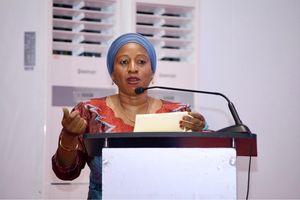Ugandan govt halts issuance of national identity cards
What you need to know:
Junior Internal Affairs minister James Baba said yesterday that data for 5.5 million people registered in the run-up to the February 2011 general elections cannot be used. “There is a problem with the integrity of the data for the 5.5 million people we received from Electoral Commission,” Mr Baba said.
Kampala. The government has ordered for fresh nation-wide registration of all Ugandans and suspended issuance of national identity cards. Suspension of a project where taxpayers have sunk more than USh300 billion is the latest in a string of procurement controversies surrounding the deal awarded to a German company on the orders of President Museveni in 2010.
Junior Internal Affairs minister James Baba said yesterday that data for 5.5 million people registered in the run-up to the February 2011 general elections cannot be used. “There is a problem with the integrity of the data for the 5.5 million people we received from Electoral Commission,” Mr Baba said.
“The data from EC was not well collected. The EC data was for the purposes of elections but for us we want data where there are fingerprints, biometrics, the eye pupils, the faces but all these things are missing.”
He said, “We have now put in place a multi-sectoral task force to embark on a mass registration exercise working with EC, Uganda Bureau of Statistics and Uganda Registration Services Bureau to ensure the integrity of the data for IDs.
This exercise is expected to start in three months’ time and by end of the year we hope to start issuing the IDs and the process will be completed in 2015.”
A Daily Monitor investigation previously revealed that the government ignored warnings from a senior official in the Ministry of Internal Affairs who had advised that a test-run for issuance of national IDs found data for at least 1.2 million people wanting.
Mr Marcellino Bwesigye, the operations manager of Uganda National Identification Programme, told the Parliamentary Committee on ICT in August 2011 that EC officials did not attach evidence of citizenship.
The minister’s revelation came during debate on Defence and Internal Affairs’ budgets. The overseeing House committee for these sectors recommended stopping the project.
“The inherent challenge is that this data was primarily meant for political electioneering purposes and some key parameters that are required for the purposes of the national IDs may not be existent,” the committee reported.
“This explains the 11 per cent success rate in the data validated exercise. Of the 214,700 datasets so far validated, only 24,707 have passed the validation.”
Parliament heard that for one to be eligible for an ID, his or her data must be backed by a legally binding birth certificate or recognised by local leaders in his or her area. However, MPs led by Alex Ruhunda (Fort Portal Municipality) demanded a full investigation and expressed concern that foreigners might get the cards, citing the country’s porous borders, corruption and forgery of birth certificates.




